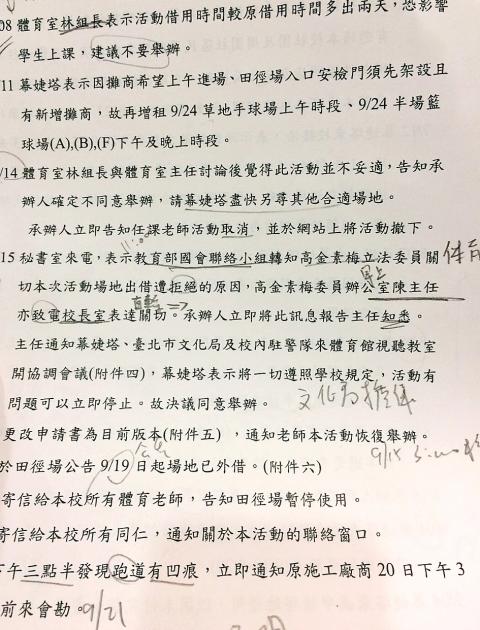Non-Partisan Solidarity Union Legislator May Chin (高金素梅) pressured National Taiwan University (NTU) to loan its athletic field for use by the “Sing! China: Shanghai-Taipei Music Festival,” according to school documents obtained by reporters.
The festival on Sept. 24 was called off just two hours after students protested over what they said was the school’s failure to prioritize students’ right to use campus facilities.
After the event was called off, three university students were assaulted, allegedly by members of the pro-unification Chinese Unity Promotion Party (CUPP).

Photo: Rachel Lin, Taipei Times
The university launched a review into its decision to host the event, which was one of series of events initiated as part of the Taipei-Shanghai Forum, and its investigative committee met for the first time on Saturday to discuss the issue.
A copy of the athletics department’s written report to the committee was obtained by the Chinese-language Liberty Times (the sister newspaper of the Taipei Times), which showed that festival organizer Mu Chieh Ta Co (幕婕塔) on Aug. 8 filed a request to rent the field for the event and it was approved the following day.
The athletics department said in the report that it had been worried that hosting the festival, which would require cordoning off the athletic field for six days, might disrupt classes and excess noise might draw protests from area residents.
Due to those concerns, the department said it decided on Sept. 14 not host the festival and told Mu Chieh Ta to look elsewhere for a venue.
However, the university president’s office and the department on Sept. 15 received telephone calls from Chin’s legislative office chief Chen Chih-huang (陳智篁) and the Ministry of Education’s Legislative Liaison Section respectively to voice Chin’s concern over the reversal and wanting to know why the school no longer wanted to host the event, the report said.
The university reversed its decision again that day and agreed to host the event after a meeting with Mu Chieh Ta and Taipei Department of Cultural Affairs Deputy Commissioner Shen Hsi-hsing (沈希行), the report said.
The second reversal was attributable to pressure from Chin’s office and Mu Chieh Ta’s promises that it would manage noise levels at the concert, the report said.
Athletics department staff involved said they felt pressured by the phone calls from Chin’s office, the report said.
Deputy Minister of Education Tsai Ching-hwa (蔡清華) said the liaison section did receive a call from Chen Chih-huang on Sept. 15 asking it “to find out” why NTU had backed out of its contract with Mu Chieh Ta.
A liaison section employee then called the university in accordance with standard operating procedures and protocols, Tsai said.
During the phone call, the employee did not ask the school to host the festival, Tsai said, adding that neither he nor Minister of Education Pan Wen-chung (潘文忠) were aware of the issue.
Chin yesterday posted on Facebook that allegations that she exerted pressure were an “exaggeration,” but that she supported cross-strait exchanges and Taipei Mayor Ko Wen-je’s (柯文哲) “rational attitude” to China.
Taiwan should not “continue to carry out purges, partisanship, political struggles against others and indulge in self-intoxication,” Chin wrote.
Chen Chih-huang said he “was unclear” the report’s allegations.
Additional reporting by Chen Fu-yu

Chinese spouse and influencer Guan Guan’s (關關) residency permit has been revoked for repeatedly posting pro-China videos that threaten national security, the National Immigration Agency confirmed today. Guan Guan has said many controversial statements in her videos posted to Douyin (抖音), including “the red flag will soon be painted all over Taiwan” and “Taiwan is an inseparable part of China,” and expressing hope for expedited reunification. The agency last year received multiple reports alleging that Guan Guan had advocated for armed reunification. After verifying the reports, the agency last month issued a notice requiring her to appear and explain her actions. Guan

The Kaohsiung Tourism Bureau audited six hotels in an effort to prevent price gouging ahead of Korean band BTS’ concert tour in the city scheduled for Nov. 19, 21 and 22 this year. The bureau on Friday said that the audits — conducted in response to allegations of unfair pricing posted on social media — found no wrongdoing. These establishments included the local branches of Chateau de Chine, Hotel Nikko, My Humble House, and Grand Hai Lai, it said, adding that the Consumer Protection Commission would have penalized price gougers had the accusations been substantiated. The bureau said the Tourism Development Act

GIVE AND TAKE: Blood demand continues to rise each year, while fewer young donors are available due to the nation’s falling birthrate, a doctor said Blood donors can redeem points earned from donations to obtain limited edition Formosan black bear travel mugs, the Kaohsiung Blood Center said yesterday, as it announced a goal of stocking 20,000 units of blood prior to the Lunar New Year. The last month of the lunar year is National Blood Donation Month, when local centers seek to stockpile blood for use during the Lunar New Year holiday. The blood demand in southern Taiwan — including Tainan and Kaohsiung, as well as Chiayi, Pingtung, Penghu and Taitung counties — is about 2,000 units per day, the center said. The donation campaign aims to boost

BACK TO WINTER: A strong continental cold air mass would move south on Tuesday next week, bringing colder temperatures to northern and central Taiwan A tropical depression east of the Philippines could soon be upgraded to be the first tropical storm of this year, the Central Weather Administration (CWA) said yesterday, adding that the next cold air mass is forecast to arrive on Monday next week. CWA forecaster Cheng Jie-ren (鄭傑仁) said the first tropical depression of this year is over waters east of the Philippines, about 1,867km southeast of Oluanpi (鵝鑾鼻), and could strengthen into Tropical Storm Nokaen by early today. The system is moving slowly from northwest to north, and is expected to remain east of the Philippines with little chance of affecting Taiwan,